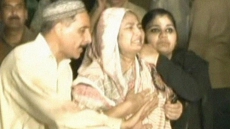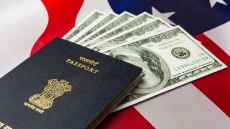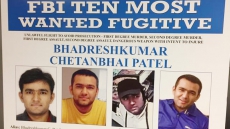DHAKA, Bangladesh (AP) — What began as peaceful protests by students in Bangladesh against a quota system for government jobs eventually turned into an uprising that forced Prime Minister Sheikh Hasina to resign and flee the country by helicopter.
Now, opposition leaders and the country's military are talking about appointing an interim government that is expected to organize new elections in what critics of Hasina say is a restoration of democracy.
The end to Hasina's over 20 years in power came after weeks of violent unrest during which nearly 300 people died, according to local media reports. She is the longest serving PM in Bangladesh's history.
The government repeatedly tried to quell demonstrations they blamed on sabotage and opposition parties with bullets, curfews and internet outages, but these heavy-handed moves backfired, fueling outrage and further protests.
On Monday, protesters defied a military curfew to march into the capital's center, following a weekend of violence left dozens of people dead. As troops pulled back and internet access was restored, tens of thousands of people began to celebrate in the streets, and thousands stormed the leader's official residence.
Here’s what we know:
Who will lead the next government?
Shortly after Hasina resigned, the country's military chief said the army would seek the figurehead president's guidance to appoint an interim government.
President Mohammed Shahabuddin announced late Monday after meeting with Gen. Waker-uz-Zamam and opposition politicians that Parliament would be dissolved as soon as possible, leading to fresh elections.
The next day, a key student leader said that the movement wanted Nobel Peace Prize laureate Muhammad Yunus to head the interim government.
Nahid Islam said in a video posted on social media that student protest leaders had already talked with Yunus, who consented to take over considering the present situation of the country.
Yunus faced a number of corruption accusations and was put on trial during Hasina’s rule. He received the Nobel in 2006 after he pioneered microlending, and he said the corruption charges against him were motivated by vengeance.
Gen. Waker-uz-Zaman also promised to launch an investigation into the deadly crackdowns that fueled outrage against the government.
“Keep faith in the military, we will investigate all the killings and punish the responsible,” he said. “I have ordered that no army and police will indulge in any kind of firing.”
He asked for patience as a new government is formed.
“Now, the students’ duty is to stay calm and help us,” he added.
How did the protests start?
The protests, which have drawn hundreds of thousands, began in July with students demonstrating against a controversial quota system that allocated government jobs.
It turned violent on July 15 as student protesters clashed with security officials and pro-government activists, prompting authorities to disperse tear gas, fire rubber bullets and to close schools and impose a curfew with a shoot-on-sight order. The internet and mobile data were also turned off.
The government says nearly 150 people died last month, while local media have reported that more than 200 were killed.
Why were they protesting?
At first, the demonstrations were against a quota system that set aside up to 30% of government jobs for family members of veterans who fought in Bangladesh’s 1971 war of independence against Pakistan.
Protesters said the system was discriminatory and benefited supporters of Prime Minister Sheikh Hasina’s Awami League party, which led the independence movement.
The furor highlighted the extent of economic distress in Bangladesh, where exports have fallen and foreign exchange reserves are running low. There’s a lack of quality jobs for young graduates, who increasingly seek the more stable and lucrative government jobs.
As the violence crested, the Supreme Court last month ruled that the veterans’ quota must be cut to 5%, with 93% of jobs to be allocated on merit. The remaining 2% will be set aside for members of ethnic minorities and transgender and disabled people.
The government accepted the decision, and restored the internet thinking that the situation would ease. But the protests grew, with new demands for investigations into the deadly crackdowns, and eventually for Hasina and her cabinet to step down.



